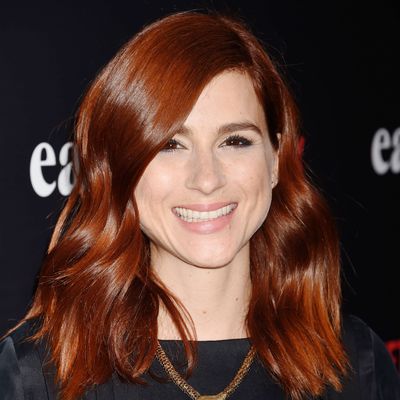
Earlier this week, California governor Jerry Brown passed a law that requires paid databases like IMDb to remove actors’ ages upon request, as a way to fight age discrimination in the entertainment industry. Of course, ageism particularly affects Hollywood women, whose onscreen opportunities become increasingly limited as they grow older — as you may have noticed, leading men are generally permitted to age, while their female love interests are not. We called up You’re the Worst star Aya Cash, who has been vocal in her support for the new legislation on Twitter, about her own experiences with ageism in the industry and her fight to make Hollywood a better place for women behind the scenes.
On why actors’ ages should be protected:
IMDb is a site used by people in the industry: The public uses it, but it’s essentially used as a job site. And as far as I’m concerned, the rights that the general public has about that stuff should be given to us as well. It’s illegal to ask your age on a job interview, because as soon as someone learns your age they decide certain things about you — and it really affects casting. It’s obviously too late for me, there’s no hiding my age, it’s out there, it’s been on IMDb a long time. This is not necessarily a fight where I’m trying to keep something a secret or ashamed of my age. I just think that people coming up in this business should have the right to decide whether or not it’s out there.
I remember an article from last year coming out, interviewing Chris [You’re The Worst co-star Chris Geere] and I, and of course they just put my age and not Chris’s. It would be nice if there was some thought behind that.
Experiencing ageism in her own career:
I get it in unexpected ways. I’ve always looked very, very young. My career started with me playing teenagers in my early 20s. And that was something where I was incredibly lucky that I looked so young, because it gave me the opportunity to break in as a 20-something who wasn’t a child actor and play roles that were open to unknowns. As soon as my age went up, my casting jumped ten years.
I was just in an audition the other day with two female filmmakers, one of them very successful. I finished my audition and then they asked me my age. They’re not allowed to do that; it’s illegal; I could report them. But of course I’m in this industry, and you’re not allowed to make a stink of it, and I told them my age. You feel pressured to answer the question and not make a problem, and then you may or may not get the job based on your answer.
The “Last Fuckable Day” problem:
I’m in my 30s. When you hit 40 it’s a whole other ball game. And you see it parodied in Amy Schumer’s “Last Fuckable Day,” but it’s real. Aging is something you ultimately can’t hide — you’re not going to be 70 playing a 25-year-old; that’s a reality. But you’ll probably be a 70-year-old woman with a 110-year-old boyfriend in a movie, because that’s the age gap that’s allowable.
Also, I don’t know what a 34-year-old looks like. I get told all the time I can’t play the age that I am because I don’t look like a 34-year-old, and that makes me want to say: Well, this is what a 34-year-old looks like.
Going behind the scenes:
You’ve got to go behind the camera to fix things in front of the camera. I have no innate desire to direct, produce, write. I love acting. I want to be an actor. However, I want to be an actor and I’m a woman. I’d like to continue this career for the rest of my life. Which is why I’m trying to do more behind-the-scenes work, so I can create interesting content for me to be a part of when I’m older. I’d love to say that I’m just super inspired by producing, and I am, now that I’m doing it. But it didn’t come from an altruistic impulse of, Oh, I want to tell more stories. It was like, No, I want to play better roles and I need to start now.
Sticking to your guns:
You have to stick to your guns, and it’s a very tough thing to do. You have to really commit to it. Everybody has to really commit to it. TV people who are hiring can’t just give you a list of three women directors and if those women aren’t available it’s just men directing the season. You have to be patient and say, You know what, that’s not the acceptable answer, the acceptable answer is to find the right person to direct.
I once debated for weeks auditioning for something that was a character that “gets fucked” by the lead. That’s how she was described; that’s not just my interpretation. And I was like, Well, but it’s good people. There are certain things that shouldn’t be compromises. I don’t think it’s acceptable to have your entire season of television directed by men anymore or by white people. I think we’re in a changing time and hopefully we won’t even be talking about it in ten years because it will be so silly.
This interview has been condensed and edited.




